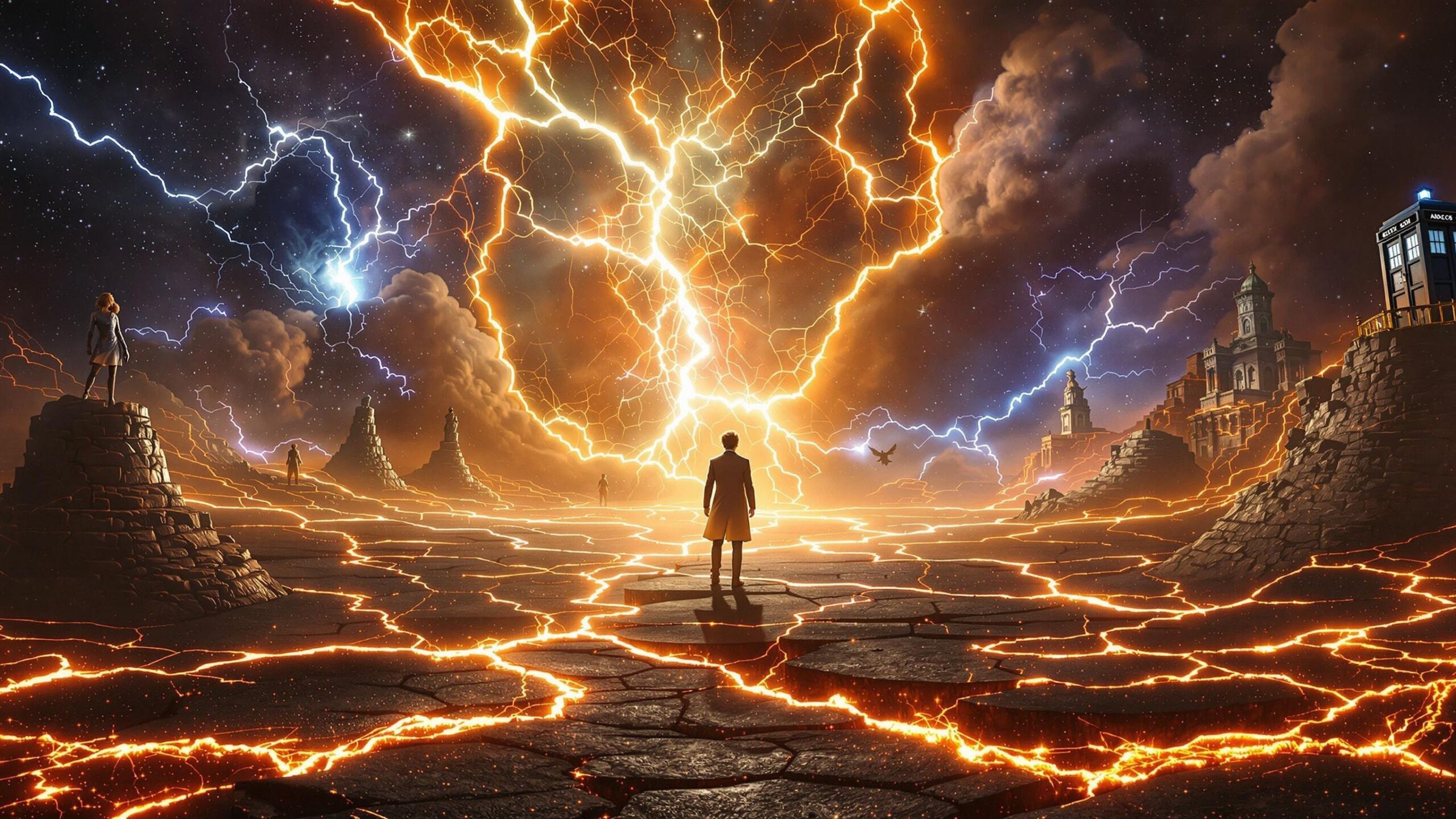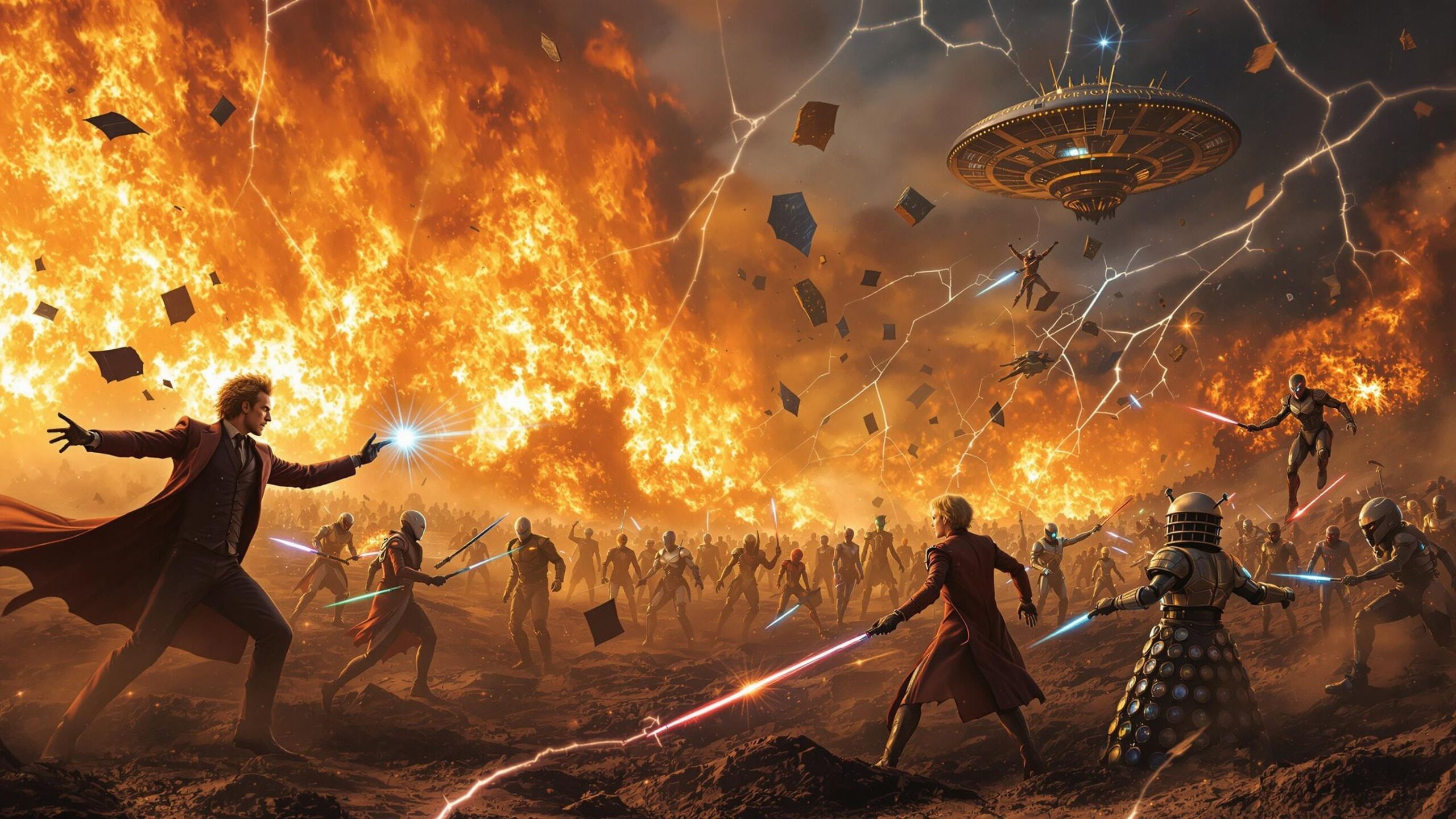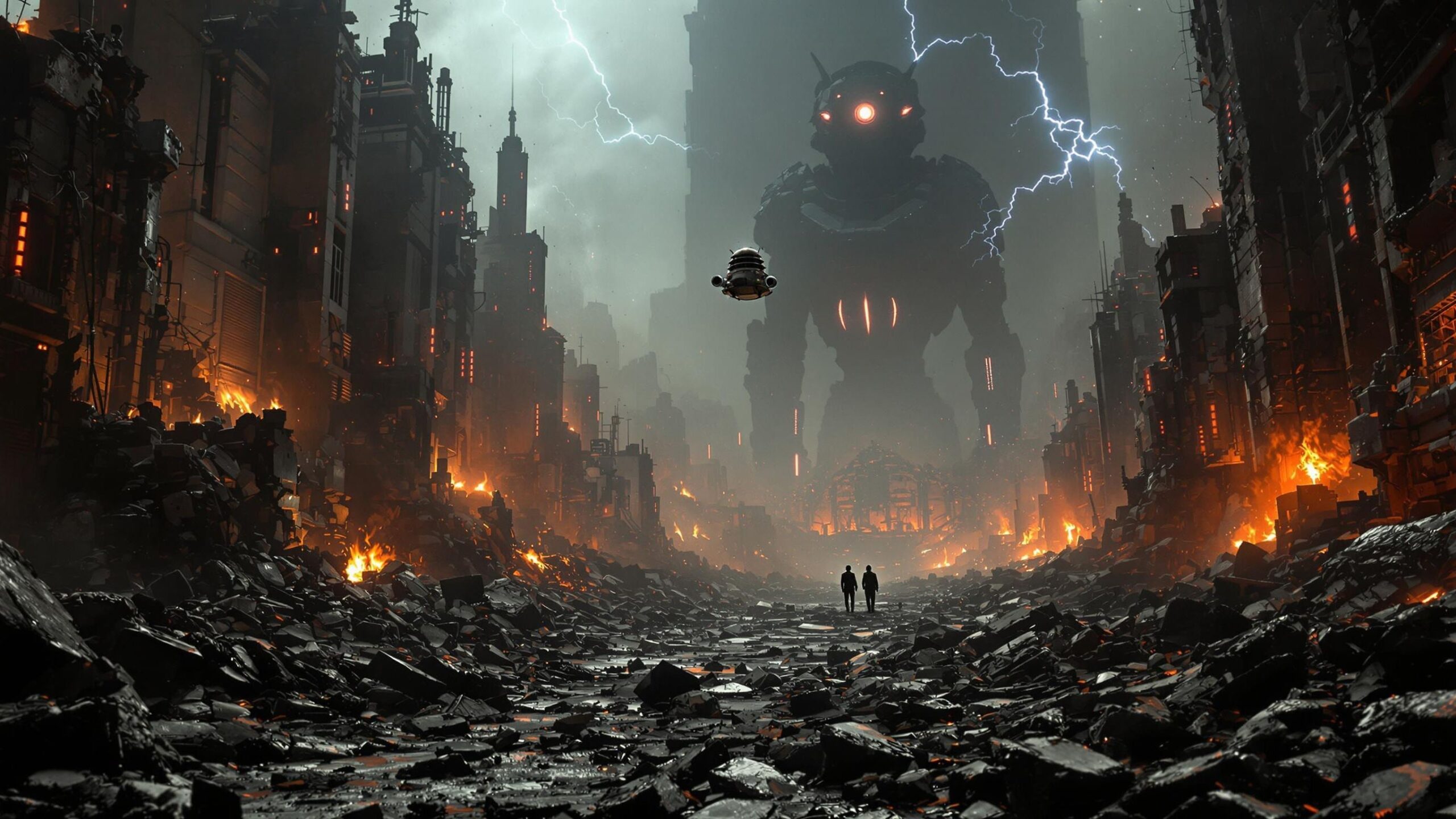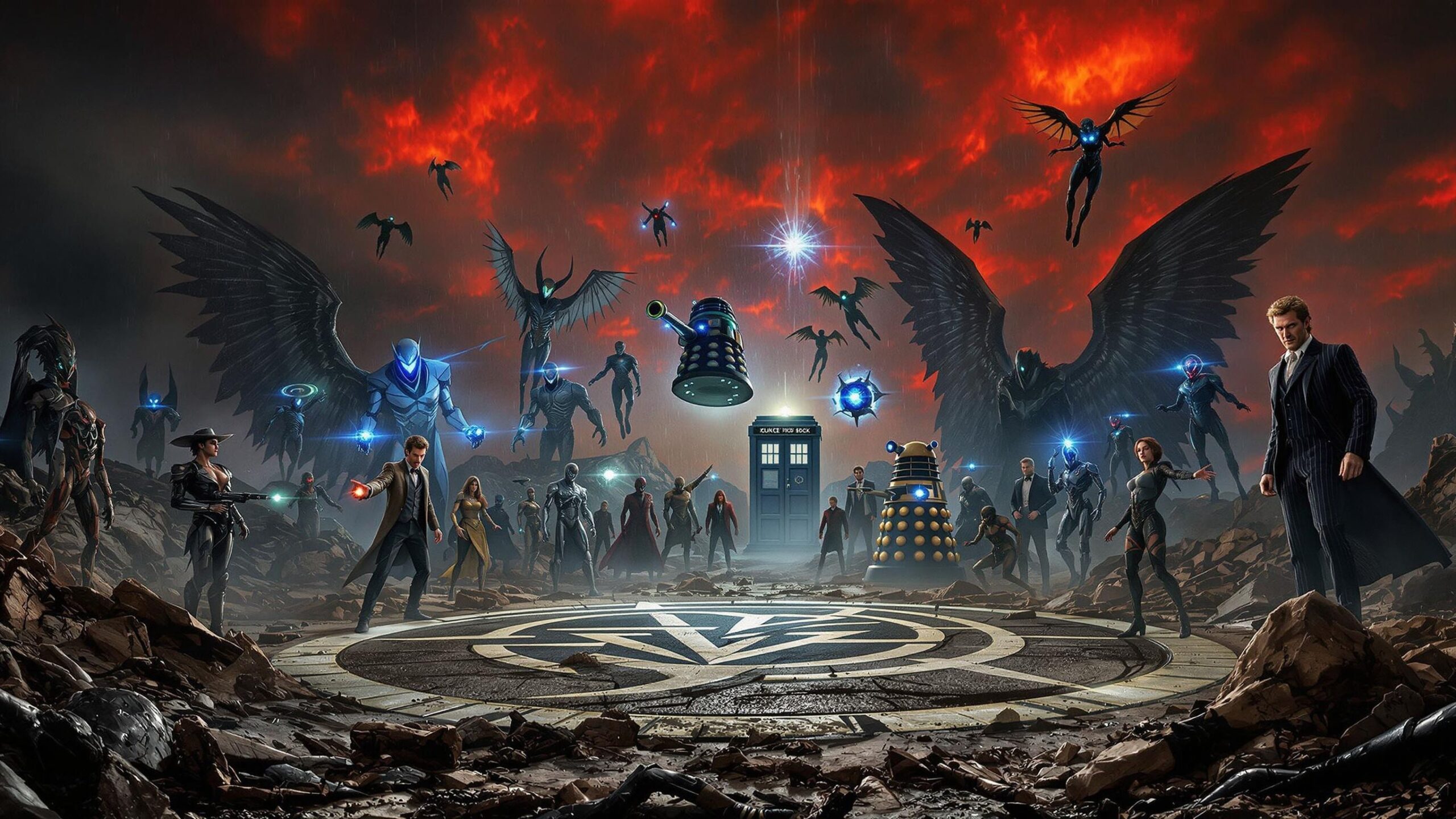In the vast continuum of Doctor Who, rivalries are not just recurring battles—they are thematic pillars, emotional reckonings, and philosophical duels that span centuries. These rivalries aren’t driven solely by conflict or hatred, but by opposing ideals, shared history, and the timeless tension between the Doctor and those who challenge everything they stand for. Some rivals reflect the Doctor’s darkest traits, while others test their limits, beliefs, and compassion. These ten rivalries have helped shape the mythology of Doctor Who, producing unforgettable moments, devastating confrontations, and moral quandaries that reverberate across time and space.
#10: The Doctor vs. The Silence
The Silence are one of the most chilling creations in modern Doctor Who. As a religious order determined to prevent the Doctor from revealing his name on the Fields of Trenzalore, their war is waged across centuries, hidden behind memory gaps and manipulated truths. The terrifying gimmick—that you forget them as soon as you look away—adds a layer of psychological horror that turns every scene into a trap. Their influence can be seen shaping events from the fall of Gallifrey to River Song’s upbringing. This rivalry isn’t just about defeating an enemy—it’s about surviving a war where the battlefield is your own memory. Their covert manipulation makes them one of the most insidious threats the Doctor has ever faced.
#9: Captain Jack Harkness vs. The Face of Boe (Theoretical)
This rivalry exists more in fan theory than direct storytelling, but the implications are haunting. Captain Jack Harkness, once a charming conman turned immortal, may eventually become the ancient and cryptic Face of Boe. If true, this would make his rivalry one of self—of a man grappling with the weight of eternity, slowly morphing from charismatic rogue to a silent, dying sage. It’s a tragic rivalry with time, loneliness, and identity. Jack’s fate—if he is Boe—would be one of the most profound arcs in Doctor Who history, transforming youthful exuberance into cosmic solitude.
#8: River Song vs. The Doctor
Their relationship is layered with romance, secrecy, reversed timelines, and impossible ethics. River is born to kill the Doctor but chooses instead to love him, creating a paradox that spans galaxies. Their rivalry isn’t always combative—it’s about control, destiny, and navigating a relationship where each person never meets the other at the right time. River’s knowledge often surpasses the Doctor’s, and her tragic awareness of their eventual goodbye turns every meeting into a countdown. It’s a beautiful, painful rivalry between freedom and fate, heart and intellect, mystery and trust.
#7: The Doctor vs. Davros
Davros, creator of the Daleks, embodies everything the Doctor despises—genocide justified by logic, science divorced from ethics, power for its own sake. From Genesis of the Daleks to The Magician’s Apprentice, their conversations are not just confrontations—they’re ideological showdowns. Davros challenges the Doctor’s morals, questioning whether he’d kill a child to prevent future atrocities. Their rivalry is intellectual and emotional, pitting creation against compassion. What elevates it is the strange, almost respectful recognition between two minds who could have walked the same path but chose opposite roads.
#6: The Tenth Doctor vs. The Racnoss Empress
Though only appearing in The Runaway Bride, the Racnoss Empress leaves a lasting impression. Her awakening triggers not just a physical battle, but a moral crisis for the Tenth Doctor. As he watches her children drown without mercy, we see a colder, lonelier version of him—a glimpse into the Time Lord Victorious. Donna Noble’s horror at his actions makes this rivalry emotionally resonant. The Empress doesn’t just provoke the Doctor’s heroism—she unveils the wrath beneath his kindness. It’s a singular but potent clash, showing how easily power can slide into vengeance.
#5: The Doctor vs. The Cybermen
Unlike the Daleks, who are creatures of hate, the Cybermen are what humanity could become through fear of death and desire for efficiency. Their rivalry with the Doctor spans every era—from Mondasian originals to parallel universe variants, to the horrifying CyberMasters. Each version highlights a new facet of horror: bodily conversion, loss of identity, and the erasure of emotion. Stories like The Tenth Planet, Earthshock, and The Doctor Falls show the Doctor’s recurring struggle not just to defeat them, but to save what’s left of the people inside the metal. This rivalry is a reflection of modern anxieties about technology, conformity, and what it means to be alive.
#4: The Doctor vs. The Weeping Angels
Few villains have made as strong an impact as the Weeping Angels. First appearing in “Blink,” their method—sending victims into the past and feeding off the energy of stolen time—is poetic and cruel. The Doctor’s battles with them are more like puzzles than fights, relying on wit and nerves rather than sonic screwdrivers. In The Angels Take Manhattan, the Angels win, taking Amy and Rory from the Doctor forever. That emotional blow, combined with their predatory patience and perfect stillness, turns them from statues to psychological nightmares. Every blink becomes a gamble. Every grave, a potential trap.
#3: The Twelfth Doctor vs. The Monks
In Series 10, the Monks present one of the most cerebral threats the Doctor has ever faced. They offer salvation through enslavement, installing a false history and manipulating the populace into thinking they’ve always ruled. Their rivalry with the Doctor is deeply ideological—they seek to save the world by rewriting its foundation. The Doctor’s resistance is as much about preserving truth as it is about toppling tyrants. His fierce speech in The Lie of the Land is a testament to his belief in flawed humanity over synthetic control. The Monks’ blend of mental manipulation, illusion, and philosophical menace make them uniquely modern adversaries.
#2: The Doctor vs. The Daleks
The Daleks are Doctor Who’s ultimate recurring evil. Created by Terry Nation, their shrieking “Exterminate!” has haunted viewers since 1963. Each Doctor confronts them differently—some with rage, others with sorrow, others with reluctant respect. The Daleks embody hatred, purity through extermination, and the loss of individuality. The Doctor has been responsible for their near-extinction multiple times, yet they always return, evolving and adapting. From Genesis of the Daleks to Resolution, their war with the Doctor is one of mutual recognition. They fear him as “The Oncoming Storm,” and he sees in them a failure he cannot undo. Their rivalry is genocidal, philosophical, and eternal.
#1: The Doctor vs. The Master
No rivalry is as complex, painful, and personal as the one between the Doctor and the Master. Born as childhood friends on Gallifrey, their bond was forged in the shadow of the Untempered Schism. The Doctor became a healer and wanderer; the Master, a manipulator and destroyer. Yet, their connection remains unbreakable. Every encounter—Delgado and Pertwee, Ainley and Davison, Simm and Tennant, Gomez and Capaldi, Dhawan and Whittaker—is electric. The Master doesn’t just want to win. They want to be seen. They want to prove that the Doctor is no better. And despite everything, the Doctor always hopes the Master can be saved. Its love twisted by ideology, brotherhood fractured by trauma. Their battles echo with shared pain, and their story is Doctor Who’s most enduring tragedy.
Rivalries in Doctor Who are not merely adversarial—they are thematic reflections of the Doctor’s soul. Each one tests a different part of their identity: their ethics, their compassion, their loneliness, their ego. These rivalries endure not just because of great writing or performances, but because they expose the fragile line between savior and destroyer. In a show about time, space, and infinite possibilities, it’s the people and ideas the Doctor fights against that define who they truly are.




